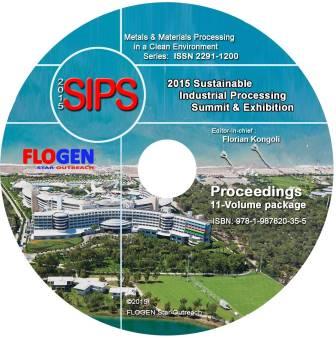2015-Sustainable Industrial Processing Summit
SIPS 2015 Volume 7: Ionic Liquids & Energy Production
| Editors: | Kongoli F, Gaune-Escard M, Mauntz M, Rubinstein J, Dodds H.L. |
| Publisher: | Flogen Star OUTREACH |
| Publication date: | 23 December 2015 |
| Pages: | 310 pages |
| ISBN: | 978-1-987820-30-0 |
| ISSN: | 2291-1227 (Metals and Materials Processing in a Clean Environment Series) |

< CD shopping page
Influence of the Second Coordination Sphere on the Standard Rate Constants of Charge Transfer for Nb(V)/Nb(IV) Chloride Complexes
Sergey Kuznetsov1; Anna Popova2;1INSTITUTE OF CHEMISTRY, KOLA SCIENCE CENTRE RAS, Apatity, Russian Federation; 2INSTITUTE OF CHEMISTRY, KOLA SCIENCE CENTRE OF RUSSIAN ACADEMY OF SCIENCES, Apatity, Russian Federation;
Type of Paper: Regular
Id Paper: 46
Topic: 13
Abstract:
The aim of the present work is the study of the second coordination sphere influence on the standard rate constants of charge transfer (ks) for the Nb(V)/Nb(IV) redox couple in chloride melts and the investigation of the working electrode nature on kinetics of the redox reaction.
Cyclic voltammetry was employed, using a VoltaLab-40 potentiostat with complementarily packaged software VoltaMaster 4, version 6. The potential scan rate varied between 5x10-2 and 2.0 V s-1.
The electrochemical redox process:
Nb(V) + e- = Nb(IV) (1)
in KCl-NbCl5 and CsCl-NbCl5 melts at 0.75 V s-1 up to 2.0 V s-1 was determined as quasi-reversible. For the NaCl-KCl (equimolar mixture)-NbCl5 melt even at a sweep rate 2.0 V s-1, the process (1) was reversible and the determination of ks could not be done.
The theory of determining the standard rate constants of charge transfer for the quasi-reversible redox processes, which are not complicated by the formation of insoluble product, was developed by Nicholson. The standard rate constants for the Nb(V)/Nb(IV) redox couple were calculated on the basis of cyclic voltammetry data.
The ks obtained in KCl-NbCl5 melt were higher than ks determined in CsCl-NbCl5 molten system. So, in alkali chloride melts, it was defined that ks (CsCl) < ks (KCl) < ks (NaCl-KCl. It was found that ks increased with increasing temperature and values of ks obtained at platinum electrode were higher than those at a glassy carbon electrode. The values of the standard rate constants testify that the redox process (1) proceeds quasi-reversibly.
Keywords:
chloride melts, niobium complexes, cyclic voltammetry, second coordination sphere, standard rate constantsReferences:
[1] V.I. Konstantinov, Electrochemical Production of Tantalum, Niobium, and Their Alloys, 1977, Moscow: Metallurgiya.[2] A.J. Bard (Ed.), Encyclopedia of electrochemistry of the elements, 1974, N.-Y., Marcel Dekker, v. 2.
[3] E.G. Polyakov: Doctoral (Chem.) Dissertation, Institute of High Temperature Electrochemistry, 1991, Sverdlovsk.
[4] E.G.Polyakov: Russ. J. Appl. Chem., v. 71 (1998), 181-193.
[5] V.F. Pimenov and Yu.V. Baimakov: Russ. J. Electrochem., v. 4 (1968), 1357-1360.
[6] S.A. Kuznetsov, A.G. Morachevskiy and P.T. Stangrit: Russ. J. Electrochem., v. 18 (1982), 1522-1526.
[7] L. Arurault, J. Bouteillon, J. Lepiney, A. Khalidi and J.C. Poignet: Mater. Sci. Forum, Paris, 1991. v. 73-75, 305-311.
[8] A. Barhoun, F. Lantelme, M.E. De Roy and J.P. Besse: Mater. Sci. Forum, Paris, 1991. v. 73-75, 313-319.
[9] A. Khalidi, P. Taxil, B Lafage and A.P. Lamare : Mater. Sci. Forum, Paris, 1991. v. 73-75, 421-427.
[10] I.R. Elizarova, E.G. Polyakov and L.P. Polyakova: Russ. J. Electrochem., v. 27 (1991), 640-647.
[11] I.R. Elizarova, E.G. Polyakov and L.P. Polyakova: Russ. J. Electrochem., v. 27 (1991), 755-761.
[12] V.D. Vasin, S.V. Maslov, S.P. Raspopin et al.: Melts, v. 4 (1990), 48-52.
[13] S.A. Kuznetsov, S.V. Kuznetsova and A.L. Glagolevskaya: Russ. J. Electrochem., v. 32 (1996), 981-987.
[14] S.A. Kuznetsov: Russ. J. Electrochem., v. 29 (1993), 1154-1160.
[15] S.A. Kuznetsov and M. Gaune-Escard: Z. Naturforsch, A: Phys. Sci., v. 57a (2002), 85-88.
[16] S.A. Kuznetsov and M. Gaune-Escard: Electrochim. Acta, 46 (2001), 1101-1111.
[17] S.A. Kuznetsov and M. Gaune-Escard: Proc. Int. Conf. Electrochem. Soc., Proc., Pennington, New Jersey, USA, 2002. v. 16, 579-589.
[18] S.A. Kuznetsov and M. Gaune-Escard: J. Electroanal. Chem., v. 595 (2006), 11-22.
[19] S.A. Kuznetsov and M. Gaune-Escard: Pros. VII Intern. Symp. on Molten Salts, Chemistry and Technology, Toulouse: Univ. P. Sabatier, 2005. v. 2, 855-859.
[20] A.V. Popova and S.A. Kuznetsov: Russ. J. Electrochem., v. 44 (2008), 921-925.
[21] S.A. Kuznetsov, V.G. Kremenetsky, A.V. Popova, O.V. Kremenetskaya and V.T. Kalinnikov:
[22] Dokl. Phys. Chem., v. 428, part 2 (2009), 209-212.
[23] A.V. Popova and S.A. Kuznetsov: ECS Transaction, v. 33 (7) (2010), 257-271.
[24] A.V. Popova, V.G. Kremenetsky, V.V. Solov'ev, L.A. Chernenko, O.V. Kremenetskaya, A.D. Fofanov and S.A Kuznetsov: Russ. J. Electrochem., v. 46 (2010), 671-679.
[25] A.V. Popova and S.A. Kuznetsov: Melts, v. 24 (2010), 32-43.
[26] A.V. Popova and S.A. Kuznetsov: Russ. J. Electrochem., v. 48 (2012), 93-98.
[27] G. Brauer, (Ed.), Handbook of Preparative Inorganic Chemistry, V. 5, 2nd Ed., 1963, New York: Academic.
[28] F. Fairbrother: The Chemistry of Niobium and Tantalum, Elsevier, 1967.
[29] V.E. Komarov, N.P. Borodina and I.A. Pakhnutov: Russ. J. Electrochem., v. 22 (1986), № 4, 478-482.
[30] S.A. Kuznetsov: Doktoral (Chem.) Dissertation, Institute of High Temperature Electrochemistry, 1993, Yekaterinburg.
[31] R.S. Nicholson: Anal. Chem., v. 37 (1965), 1351-1355.
[32] S.A. Kuznetsov, S.V. Kuznetsova and P.T. Stangrit: Russ. J. Electrochem., v. 26 (1990), 55-60.
[33] R.S. Nicholson and J. Shain: Anal. Chem., v. 36 (1964), 706-723.
[34] L.I. Krishtalik, Electrode Reactions, Mechanism of elementary Act, 1982, Moscow: Nauka.
[35] H. Matsuda and Y. Ayabe: Z. Elektrochem., v. 59 (1955), 494-503.